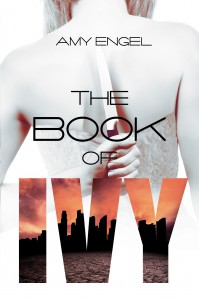Review: The Book of Ivy by Amy Engel


The Book of Ivy is yet another YA novel set in a dystopian society in which the world has been destroyed by nuclear war and a greatly diminished population struggles to keep the human race alive. The individuals who survived the war are divided by allegiances to the Westfall and Lattimer families who settled the area they occupy. The Westfall family fell out of power and must obey the often oppressive government ruled by President Lattimer. In this society, the daughters of the losing side of the battle must enter into an arranged marriage with the winning side of the conflict and the daughters of the winning side marry the men on the losing side. This is done in an effort to maintain peace and diminish the likelihood of uprisings against the government. When Ivy Westfall is sixteen years old, it is her turn to be married. Unlike other girls her age, however, she is destined to be married to President Lattimer's son. What the Lattimer family does not know is that she has been tasked with a secret mission to take down their family and kill her new husband so her family can rise to power and rule.
The plot of this novel does not bring anything new to the vast number dystopian stories that have been written. The world-building is vague and a little underwhelming, and there are some inconsistencies that are difficult to dismiss. This society seems to be largely homogenous and Caucasian (not realistic), and how the characters obtain certain necessities for survival is a mystery. There are multiple scenes in which Bishop and Ivy eat things like eggs, steak, sandwiches with lunch meat, cheese, strawberries and pastries. These people also have running water and take daily showers without thought of radioactive material contaminating their water. How is it that their water doesn't make them sick, and how do cows and chickens survive a nuclear war that decimates most of the world's population? We don't see any farming communities or greenhouses in the story and it doesn't sound like this community goes outside the fence to hunt, so it is a puzzle how these people are able to conserve and produce basic resources needed for survival. We're also told that people have the option to work if they want to but it's not a requirement for newly wed couples whose main purpose is to be fruitful and multiply.....wouldn't a population of only ten thousand people need to band together and work to produce precious resources, especially the younger and likely stronger members of the community? I really don't get it.
Although there are multiple inconsistencies with the plot and the world-building is average, Ivy's life is compelling. Her portrayal as a vulnerable sixteen year old girl is believable and it is not hard to understand her motives or conflicted feelings. She has been isolated from other people in her community and wants nothing more than to please her father. She is still very young and is not ready for marriage, especially to a complete stranger who is disliked by her family. It's easy to sympathize with her as family secrets are revealed and she gradually allows herself to get to know Bishop Lattimer. Bishop is not the monster described to Ivy and is nothing like his father, which makes Ivy's mission for vengeance increasingly difficult to carry out. Torn between her loyalty to her family and a growing attachment to her husband, she is forced to come to terms about who she is and who she wants to be.
The book is nowhere near perfect, but the story is entertaining and I am anxious to find out what happens to Ivy and Bishop in the next book, which is scheduled to be released in November.









